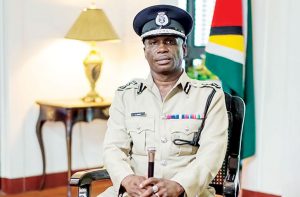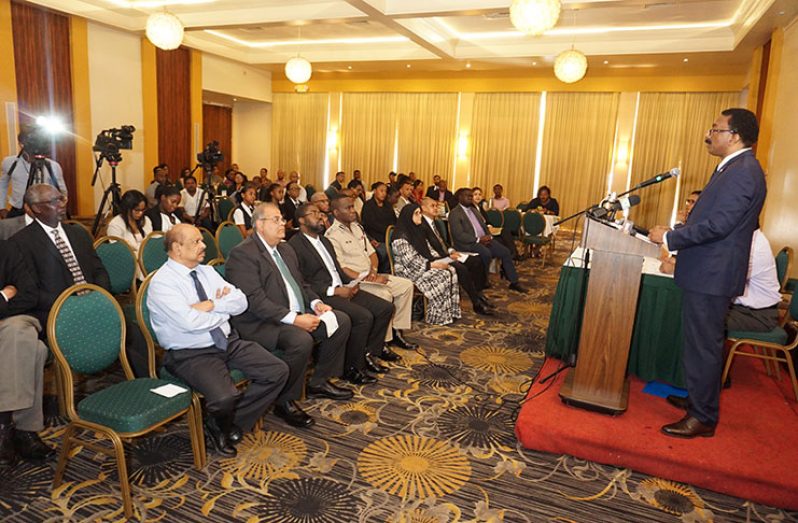…AG urges more prosecutions, convictions of money launderers
By Svetlana Marshall
BLASTING the Special Organised Crime Unit (SOCU) over its failure to effectively conduct investigations, Attorney General and Minister of Legal Affairs, Basil Williams, on Thursday, said the investigative body must fulfill its mandate as Guyana wages war against money laundering and terrorism financing.
In an address during the opening ceremony of Guyana’s Money Laundering and Terrorism Financing (ML/TF) National Risk Assessment at the Pegasus Hotel, Williams stated that investigations, prosecutions and convictions are critical as the country prepares for the 4th Round of Mutual Evaluation by the Financial Action Task Force (FATF).
“While, in the 3rd round, we erected the legal framework, the 4th round is intended to see how effective it is, and one of the things we have to deal with is the question of investigations, prosecutions and convictions for money-laundering offences,” the Attorney General explained.
“Would you believe, from 2015 to now, we haven’t had any, not one,” he further added while noting that though some countries have had prosecutions and convictions, they were still deemed ineffective.
It was while underscoring the importance of having investigations, prosecutions and convictions of money-laundering offences that the Attorney General expressed his disappointment with SOCU. “SOCU is a mess, so we have to reorganise SOCU and we have to make it effective,” Minister Williams told those present, while welcoming the appointment of its new acting Head, Althea Padmore.
Padmore replaced Sydney James, who was sent on administrative leave, in light of allegations of mismanagement of funds at the entity in charge of investigating white-collar crimes such as corruption and money laundering.
An audit of SOCU had revealed that there were serious irregularities including the falsification of records. The audit was ordered by the Commissioner of Police in February following claims of grave mismanagement which included the misuse of its operational fund.
Steps being taken to fix SOCU

Weighing in on the matter, on the margins of the seminar, Commissioner of Police, Leslie James, told Guyana Chronicle that steps are being taken to address the deficiencies within SOCU. Its staff capacity has increased from eight to 13. “I have met with the Head designate of SOCU. I have also met with all of the staff of SOCU. I have caused some internal things to be done, that is, the staff, they were exposed to integrity testing. The only thing left now is for me to meet with the other prosecutors of SOCU. I met with one, in the person of Mr. Harris, I’m to meet with the others, and all are efforts to have SOCU reformed,” the Police Commissioner told this newspaper.
Earlier this year, the U.S Department of State reported that though Guyana made significant progress on the Anti-Money Laundering (AML) front, more investigations and successful prosecutions were needed. In its 2019 US International Narcotics Control Strategy Report Volume II: Money Laundering, the U.S Department of State noted that Guyana’s National Risk Assessment 2017 found that it has a medium-to-high money laundering risk.
“Unregulated currency exchange houses and dealers in precious metals and stones pose a risk to Guyana’s AML/CFT system. Other sectoral vulnerabilities include the banking industry and unregulated attorneys, real estate agents, used car dealers, and charities,” the U.S Department of State explained. The Attorney General said as the country undergoes this second round of Risk Assessment (December, 2019-September, 2020), it will assess its risks, apply a risk-based approach and put measures in place to mitigate identified risks. Government, he said, remains committed.
“Our Government will continue to put resources into the fight against money laundering, terrorist financing and proliferation financing. We have to be proactive. We had nothing to do with proliferation financing but we still pass the legislation,” Minister Williams told those present at the NRA seminar. He noted that with the Oil and Gas Sector on the horizon, it is important to ensure that the country is not blacklisted by FATF and or CFATF- the Caribbean Financial Action Task Force.
A Working Group of approximately seventy-six (76) persons representing both public and private sector organisations was established to carry out the country’s second ML/TF National Risk Assessment (NRA) exercise. The World Bank is providing technical assistance.


.jpg)











